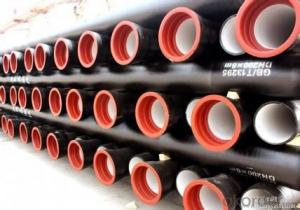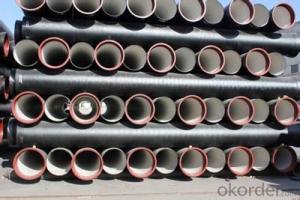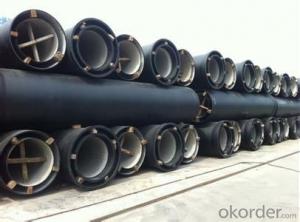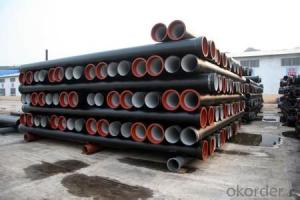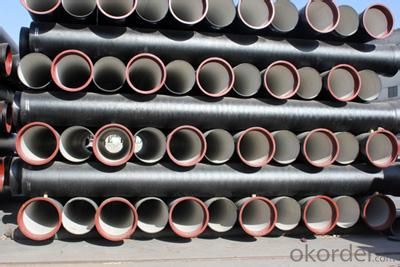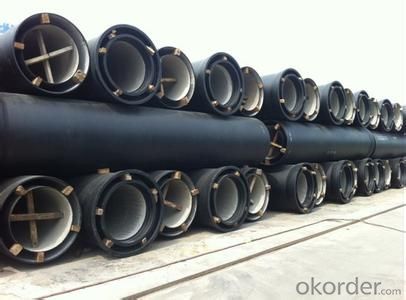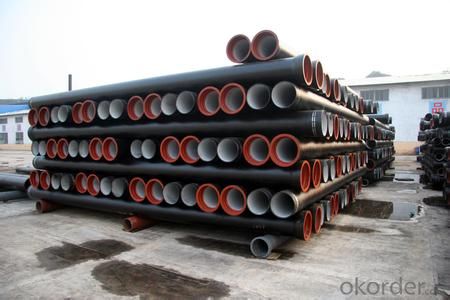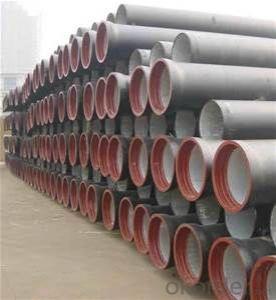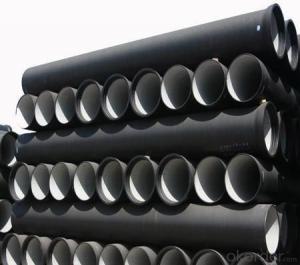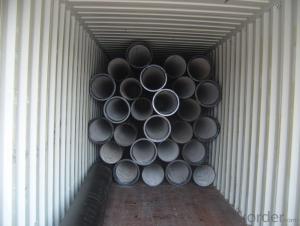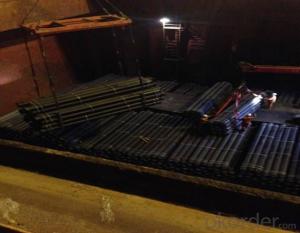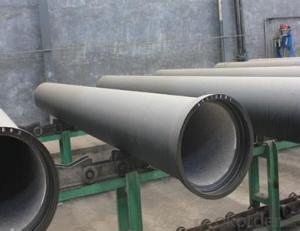DUCTILE IRON PIPE K8 DN200
- Loading Port:
- China Main Port
- Payment Terms:
- TT OR LC
- Min Order Qty:
- -
- Supply Capability:
- -
OKorder Service Pledge
OKorder Financial Service
You Might Also Like
Ductile Iron Cast Pipe is without any defects compare with tradition casting tech, which has many advantages particularly as follow:
(1) High density. In the "vertical upward casting" process, the melt iron of centre liquid column in center crystallizer is continuously feeding for volume shrinkage caused by condensation tube at outer circumference , which lead to be free of shrinkage porosity.
(2) High purity. When melt iron pouring, the mixed impurities such as gas, dross, sand grain which are lighter than melt iron could be eliminated at furnace mouth, its impossible to enter into the crystallizer through the channel, so the melt iron into the crystallizer is very pure.
(3) Strength with toughness. The cooling speed provided by continuous crystallizer is 30 times than sand casting and 5 times than centrifugal casting, and doesn't produce white iron, the eutectic cell volume of continuous cast iron is one eighth to one tenth compare with traditional cast iron. The density of graphite nodule in ductile iron can reach 300-700 pcs/mm2. Therefore, all reason above improve the strength and toughness of continuous cast iron.
(4) Free machining. The high speed cooling make the hardening phase (such as boride, steadite) not appear like reticular, massive or thick, but diffuse like fish bone and pane in shape, moreover, there are tiny graphite flakes inlaid hardening phase. It's free machining in BrinellHardness the range of 250-300HB. However, the Brinell Hardness of 250 is top limit to common metal materials.
(5) Uniform composition of tube wall. The convection mixing of liquid column caused by marching type drawing in crystallizer make the composition of tube wall well-distributed, and concentration gradient very little.
(6) High productivity. To the wall thickness of tube under 10mm, the speed of continuous casting is 1 meter/min, to the wall thickness of tube under 20mm, the speed of continuous casting is 0.5 meter/min, which is high efficiency that centrifugal or other casting tech couldn't reach.
- Q: What are the specifications of cast iron pipes?
- Compared with grey cast iron pipe, ductile iron pipe has higher strength, better toughness, thinner tube wall, less metal consumption, and can bear higher pressure. The effective length is 5 meters and 6 meters. According to the wall thickness, it is divided into two grades P and G. It is the development direction of cast iron pipe.
- Q: How does ductile iron pipe perform in areas with high soil acidity?
- Ductile iron pipe performs well in areas with high soil acidity due to its inherent corrosion resistance properties. The pipe is designed to withstand harsh environments and has a protective lining that prevents the acidic soil from causing damage. This lining acts as a barrier between the pipe and the soil, preventing the acid from corroding the iron. Additionally, ductile iron pipe has a high resistance to external loads, making it suitable for areas with unstable soil conditions. Overall, ductile iron pipe is a reliable choice for areas with high soil acidity as it can withstand the corrosive effects and provide long-lasting performance.
- Q: The difference between HDPE pipe and ductile iron pipe
- Different installation methods, ductile iron pipes are common flexible sealing ring, slide into the connection; the main drainage pipe is W and B type, clamp connection and mechanical connection, the inner gasket ring.
- Q: Is the fire hose capable of using rapid repair joints?
- Lubrication. Edible oil can be used as lubricant and evenly brush on the socket end and rubber ring.
- Q: Are ductile iron pipes resistant to abrasion?
- Indeed, abrasion is no match for ductile iron pipes. Ductile iron, a form of cast iron fortified with magnesium, undergoes this treatment to enhance its robustness and malleability. Consequently, it becomes exceptionally resistant to deterioration, including abrasion. These pipes find widespread use in scenarios where they encounter abrasive substances like sand, gravel, and other particles during fluid transportation. The material's remarkable capacity to endure abrasion guarantees its endurance and dependability across diverse sectors, ranging from water distribution and sewer systems to industrial pipelines.
- Q: Can ductile iron pipes be used for irrigation of sports fields?
- Yes, ductile iron pipes can be used for irrigation of sports fields. Ductile iron pipes are known for their strength, durability, and flexibility, making them an ideal choice for various applications, including irrigation. These pipes have high resistance to external pressures and impact, which is beneficial for sports fields that may experience heavy foot traffic and potential damage. Additionally, ductile iron pipes have excellent corrosion resistance, ensuring long-term performance and minimal maintenance. Their smooth interior surface also allows for efficient water flow, preventing clogs and ensuring adequate irrigation for the sports fields. Overall, ductile iron pipes are a reliable and suitable option for irrigation systems in sports fields.
- Q: What is ductile iron pipe?
- Ductile cast iron is defined using the above number 18 by adding nodulizer, after centrifugal ductile cast iron machine centrifugal cast pipe, ductile iron pipe (called [span]Ductile Cast Iron Pipes), referred to as ball pipe, ductile iron pipe and ductile iron pipe etc..
- Q: How does ductile iron pipe perform in corrosive soils?
- Due to its inherent corrosion resistance properties, ductile iron pipe demonstrates exceptional performance in corrosive soils. This is attributed to its unique composition of iron, carbon, and other elements that enhance its durability and resistance to corrosion. A key feature of ductile iron pipe is its protective lining, which is either cement mortar or a special epoxy coating. This lining acts as a barrier between the corrosive soil and the pipe, preventing direct contact and corrosion. Furthermore, compared to other materials like steel, ductile iron pipe exhibits higher resistance to external corrosion. It can withstand the chemical reactions caused by acidic or alkaline soils and remains unaffected by the corrosive elements present in the ground. This quality makes it an ideal choice for installation in highly corrosive soil areas. Moreover, ductile iron pipe has a long service life, further contributing to its performance in corrosive soils. Its durability and resistance to corrosion ensure that it can withstand the challenges posed by corrosive soils for several decades without significant degradation. In conclusion, ductile iron pipe excels in corrosive soils due to its protective lining, resistance to external corrosion, and long service life. Its ability to withstand the harsh conditions presented by corrosive soils makes it a reliable and durable choice for various applications such as water distribution, sewage systems, and industrial pipelines.
- Q: Can ductile iron pipes be repaired if damaged?
- If there is any damage to ductile iron pipes, they can indeed be repaired. The process of repairing them involves several steps. Firstly, it is necessary to identify and isolate the damaged section of the pipe. Once this has been accomplished, the damaged portion of the pipe is typically cut out and removed. Subsequently, a new section of pipe is inserted and connected to the existing pipeline using appropriate methods such as welding or mechanical jointing. The repaired section is then tested to guarantee its integrity and functionality. It is important to note that the repair process may vary depending on the extent and nature of the damage. Therefore, it is always advisable to seek advice from professionals who specialize in ductile iron pipe repairs to ensure a proper and effective restoration is achieved.
- Q: Ductile iron pipe, socket connection, pipe length, you can cut open it?
- The cutting length is 4 meters from the jack. Among them, DN300 below 100% can be cut, DN350 above shear ratio is 10%, cut the small head to do chamfering treatment.
Send your message to us
DUCTILE IRON PIPE K8 DN200
- Loading Port:
- China Main Port
- Payment Terms:
- TT OR LC
- Min Order Qty:
- -
- Supply Capability:
- -
OKorder Service Pledge
OKorder Financial Service
Similar products
Hot products
Hot Searches
Related keywords
